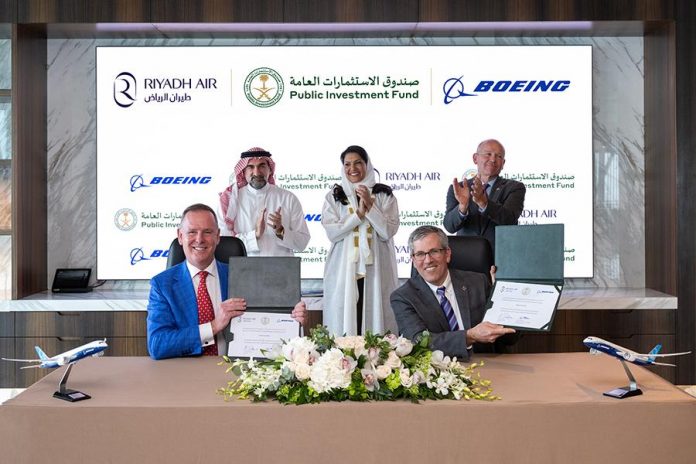Saudi Arabian flag carriers Riyadh Air and Saudia have placed orders for up to a combined 121 Boeing 787s in what could amount to the fifth largest commercial order by value in the OEM’s history.
The 787s will be powered by GE Aerospace GEnx engines, according to the U.S. Secretary of Commerce.
The Saudi Arabian state-owned carriers said they will order 78 787s with options for a further 43 aircraft. The new orders will be posted to Boeing’s Orders and Deliveries website once finalized, Boeing said.
Finalizing both orders would boost Boeing’s 787 backlog 14% and fill delivery slots being created by a planned production ramp-up. The company has been building 787s at a rate of about two per month recently, and is targeting five per month in 2024, climbing to 10 per month in 2025-26. Boeing’s 787 firm-order backlog stood at 574 aircraft on March 1, including 59 in the ASC 606 accounting category that flags them as on shaky ground due to customer issues.
The newly launched Riyadh Air said it would purchase 39 787-9s for its global launch, with options for an additional 33 787-9s. The -9 is the longest-range model in the 787 family.
Saudia will purchase 39 787 widebodies with a further 10 options. The agreement will include both 787-9 and 787-10s.
Both deals form part of Saudi Arabia’s broader strategic plan to create a global aviation hub, with an objective of serving 330 million passengers and attracting 100 million visitors annually by 2030.
Saudia already operates more than 50 Boeing aircraft on its long-haul network, including 777-300ERs, 787-9s and 787-10s. “The additional 787s complement Saudia’s existing fleet, enabling it to effectively harness the value of the 777 and 787 families,” Boeing said March 14.
“Saudia continues its expansion efforts in all aspects of the airline, whether it’s introducing new destinations or increasing the aircraft fleet,” said Ibrahim Al-Omar, Director General of Saudia Group.
“Adding to its 787 Dreamliner fleet will enable Saudia to expand its long-haul service with outstanding range, capacity and efficiency,” said Stan Deal, President and CEO of Boeing Commercial Airplanes. The 787 offers around a 25% reduction in fuel burn and emissions compared to the Saudia aircraft it will replace, Boeing said.
Riyadh Air, which is owned by Saudi Arabia’s Public Investment Fund (PIF) and whose CEO is former Etihad Airways CEO Tony Douglas, has been set up to play a key role in growing Saudi Arabia’s air transport network, which are part of the Kingdom’s strategy of diversifying away from oil.
Saudi Arabia’s Crown Prince Mohammad bin Salman formally launched Riyadh Air March 12.
“The new airline reflects the ambitious vision of Saudi Arabia to be at the core of shaping the future of global air travel and be a true disrupter in terms of customer experience,” Douglas said. “By positioning the airline as both a global connector and a vehicle to drive tourist and business travel to Saudi Arabia, our new 787-9 airplanes will serve as a foundation for our worldwide operations as we build the wider network and connect our guests to Saudi Arabia and many destinations around the world.”
U.S. Secretary of Commerce Gina Raimondo said the orders are “a clear win for American manufacturers and workers, supporting more than 140,000 jobs at over 300 Boeing suppliers across 38 states. Moreover, the Kingdom of Saudi Arabia has selected GE Aerospace’s GEnx engine to power the aircraft, providing billions more in U.S. exports and supporting good-paying American jobs.”
Raimondo said the deal was one of the largest commercial agreements in the long history of the U.S.-Saudi partnership, noting that in 1945 President Franklin D. Roosevelt provided King Abdulaziz al Saud with Saudi Arabia’s first airplane, a DC-3 Dakota.
























